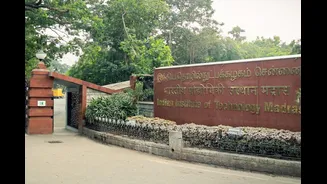The Indian Institute of Technology Madras (IIT Madras) has launched the new ‘Language and Cognition Laboratory’ (LC-Lab) to study India’s rich linguistic diversity through an interdisciplinary and technology-driven
approach. Set up in the Department of Humanities and Social Sciences, it is the first lab in the country to focus on India’s many languages through systematic research in experimental linguistics.
The LC-Lab, inaugurated on 10 November 2025 by IIT Madras Director Prof. V. Kamakoti, began operations in the presence of HSS Department Head Prof. Rajesh Kumar, Faculty Coordinator Dr. Anindita Sahoo, and other faculty members and stakeholders. The facility will examine how humans perceive, process, and produce language using modern experimental tools.
In the long run, the lab aims to support the creation of human-centred and linguistically aware AI systems so that Indian languages and cultures are better represented in new technologies. The LC-Lab will collaborate with the Centre for Responsible AI (CeRAI), IIT Madras, to study how AI methods can be used in language and cognition research.
Explaining the importance of such interdisciplinary work, Prof. V. Kamakoti, Director, IIT Madras, said, “Linguistics is increasingly moving toward empirical, data-driven inquiry, combining methodologies from the sciences and humanities. India needed a dedicated facility that integrated linguistic theory with modern experimental and computational tools. The Language and Cognition Lab was established to fill this gap—creating a space that connects linguistics, cognitive science, neuroscience, and artificial intelligence, and contributes to the development of socially relevant, linguistically informed technologies.”
The LC-Lab will study how people understand linguistic information through methods such as eye-tracking and reaction-time experiments. The research will mainly focus on Indian languages and aims to offer insights into how grammar, voice, and sentence structure are processed and produced in multilingual environments.
Current projects examine areas such as grammatical voice and copula constructions. New work will soon begin on studying dyslexia among Indian children with the aim of improving learning outcomes and developing teaching methods that are more sensitive to linguistic diversity.
Highlighting the lab’s academic direction, Faculty Coordinator Dr. Anindita Sahoo said, “The Language and Cognition laboratory (LC-Lab) is dedicated to advancing interdisciplinary research in language and cognition through the use of technologies that reveal behavioural patterns and enable data-driven understanding of human interaction.”
The lab follows an interdisciplinary framework that brings together perspectives from science, technology, and the humanities to support both research and technological innovation. In the short term, researchers will carry out experimental studies using eye-tracking machines to test established linguistic theories in Indian languages. In the long term, the team plans to add advanced neurocognitive tools such as Electroencephalography (EEG) and Transcranial Magnetic Stimulation (TMS).
These technologies will help build a deeper understanding of language, cognition, and computational modelling and will encourage collaboration with experts in areas such as psychology, neuroscience, and artificial intelligence.
ALSO READ: Centre To Set Up 100 New Sainik Schools Under PPP Model: Amit Shah
The LC-Lab has been supported by IITM Pravartak Technologies Foundation and Aspire Infolab, Hyderabad, which have funded its establishment and infrastructure.
Before the official inauguration, IIT Madras hosted a symposium featuring a panel discussion titled ‘Language for thought: Exploring Interdisciplinary Dimensions’. The session opened with introductory remarks by Prof. Balaraman Ravindran, Head of CeRAI. The panel included Dr. Sanjiv Patjoshi (IPS), DGP, Prof. Vijayanthi Sarma from IIT Bombay’s HSS Department, and Prof. Maria Teresa Guasti from Università degli Studi Milano-Bicocca, Italy.
The discussion was moderated by Prof. Sudharsan Padmanabhan, IIT Madras, and focused on how language connects with thought across fields such as philosophy, psychology, technology, policy, and public life.














